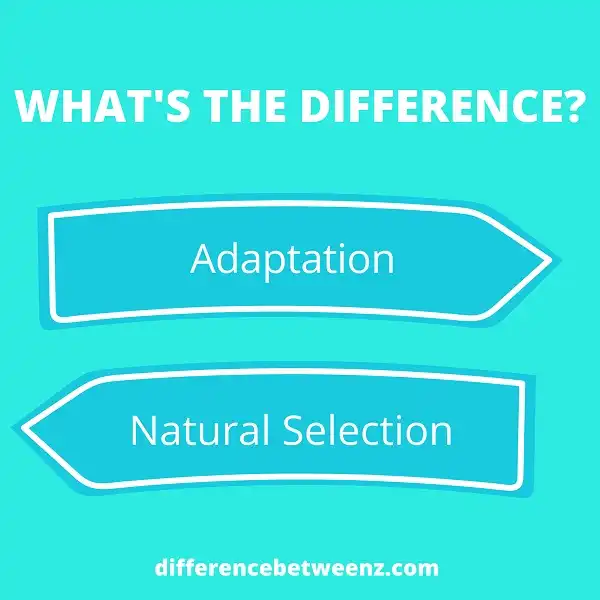In the natural world, organisms must constantly adapt to their environment in order to survive. This process of adaptation is accomplished through the mechanism of natural selection. However, not all adaptations are the result of natural selection; some are due to genetic drift or mutation. This can be a confusing concept for people who are new to evolutionary biology, so let’s take a closer look at the difference between adaptation and natural selection.
What is Adaptation?
Adaptation is the process by which an organism becomes better suited to its environment. This can happen over a period of many generations, as natural selection favors those individuals who are best adapted to their surroundings. It can also happen within a single generation, as offspring inherit adaptive traits from their parents. Adaptation can take many different forms, from physical changes like longer limbs or thicker fur to behavioral changes like increased vigilance or changes in migratory patterns. Ultimately, adaptation is essential for survival, and it is one of the most important forces shaping the natural world.
What is Natural Selection?
- Natural Selection is a process in which individuals in a population are more likely to survive and reproduce if they have certain heritable traits. This process results in the gradual change of a species over time as the traits that are most advantageous become more common. Natural selection can occur on any level, from the level of individuals to the level of species.
- On an individual level, natural selection occurs when some individuals in a population are better equipped to survive and reproduce than others. This can be due to many factors, such as being faster, stronger, or more resistant to disease. Over time, these individuals will be more likely to pass on their genes to future generations, and the population as a whole will become better adapted to its environment. On a species level, natural selection can cause two different species to diverge over time as they adapt to different niches.
- For example, if one species becomes better at eating insects while another becomes better at eating fruit, they will eventually become so different that they will no longer be able to breed with each other. Natural selection is one of the main mechanisms by which evolution occurs.
Difference between Adaptation and Natural Selection
- Adaptation and natural selection are two terms that are often used interchangeably, but they actually refer to two different processes. Adaptation is a change that occurs in an organism in response to its environment. This can be a physical change, such as longer fur to protect against the cold, or a behavioral change, such as migration to a new location.
- Natural selection, on the other hand, is the process by which adaptive traits are passed on from one generation to the next. This means that organisms with traits that are better suited to their environment are more likely to survive and reproduce than those with less adaptive traits. Over time, this can lead to changes in the overall composition of a population.
- So while adaptation and natural selection are related, they are ultimately two different things. Adaptation is a change that occurs within an organism, while natural selection is the process by which adaptive traits are passed on from one generation to the next.
Conclusion
The concepts of adaptation and natural selection are two of the most important in all of biology. While they are often confused, it is important to understand the difference between them. Adaptation occurs when an organism changes its behavior or physical characteristics in order to better survive in its environment. Natural selection, on the other hand, is the process by which organisms that are best adapted to their environment survive and reproduce at a higher rate than those that are less well adapted.


